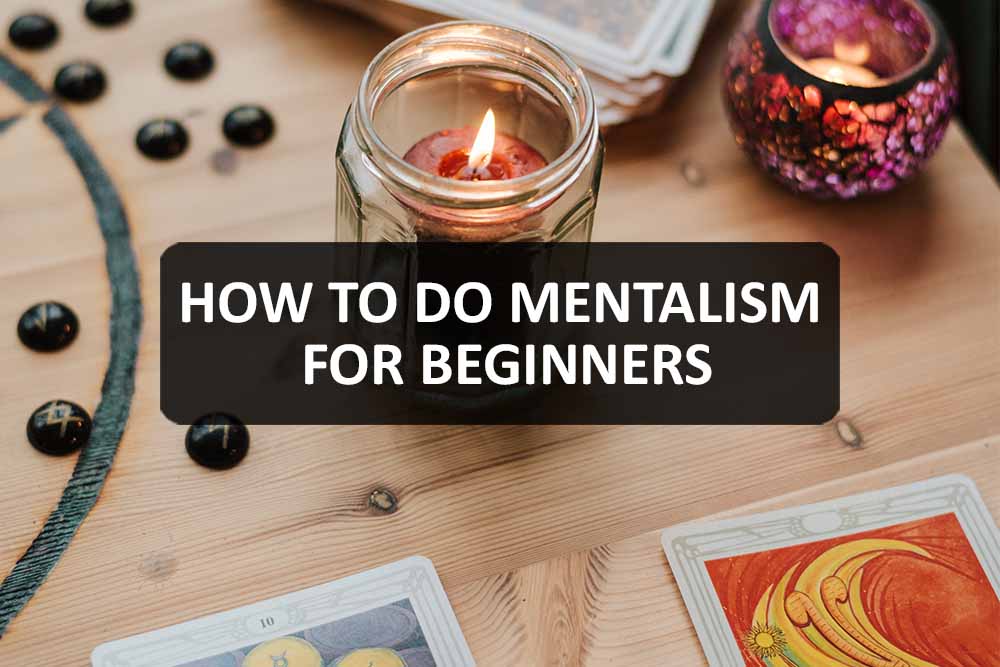All new mentalists have to begin with expanding their knowledge to become successful at performing mentalism acts.
There are different effects and techniques that make up performances, so it isn’t just the tricks – there are so many different aspects that you’ll have to learn to be excellent at it.
But the thing is, if you try to tackle it all at once, you may be setting yourself up to fail.
So for now, let’s start with “how to do mentalism for beginners”. Here, we’ll take you through the most crucial mentalist skills that you should learn.
So let’s get straight into it!
Observation Skills: Paying Attention to the Small Stuff
When you’re a beginner in mentalism, working on your observation skills is something you’d want to invest time in.
The good news is you don’t have to spend any money — several activities allow you to achieve the same results without spending a dime.
Here are a couple of things you can do on a daily basis.
Pause and take in everything around you. Make it a point to take a few minutes to yourself each day and use that time to notice details you would ordinarily glaze over. We are often so used to the daily routines that we go on autopilot. It is particularly true when we are traveling a familiar route, causing us to miss out on many aspects of our commute.
Zero in on the details. Larger things in our environment often draw our attention. Try to deliberately direct your focus on the finer details, such as the number of windows in your favorite Italian restaurant or the number of carts you pass on your way to the subway station.
Be present. With the usual hustle and bustle in our daily lives, it’s normal to get distracted by noises, your phone, or even your thoughts. It makes us less observant because we’re often inside our heads, thinking of what’s already happened or wondering what’s about to happen. The next time you’re outside, use your senses to describe your surroundings — What do you see? What noises do you hear? Is there a breeze?
Start counting. As you work on developing your observation skills, try to quantify the things you notice. It forces you to pay more attention to their size or shape. Continue doing this for several days, and you’ll soon realize you can count objects quicker.
By enhancing your observation skills, you’ll be able to apply this to your audience and will be able to “read” them more clearly for a “wow” factor.
Decoding Skills: Correctly Interpreting What People Mean
Decoding means understanding a person’s real message even when they said something else. It allows you to hear more than what people are saying, such as the meaning and feelings behind their words.
As a mentalist, your ability to listen to your subject’s responses impacts your performance.
There is a big difference between hearing what someone says and listening to them. A lot of people hear what people verbalize but don’t listen to the underlying meaning.
Studies say there are different levels of listening — and the highest level is when you listen to what someone is not saying. Empathic listening happens when you pay attention to non-verbals — their gestures or tone.
Asides from this, though, there are other techniques you can combine with listening that will make you a better mentalist. Let’s take a quick look at some:
Maximizing Micro Expressions
A microexpression is an extremely brief, involuntary facial expression people make when they experience a particular emotion. These cannot be faked, so knowing how to read them can give you an advantage as a mentalist.
Microexpressions give you glimpses of how people truly feel, allowing you to gather more information, give more accurate guesses, and gain more confidence during your performance.
Observing Your Own Responses
When you’re working on developing essential skills for mentalists, there’s no better place to begin than yourself. If you’re studying non-verbal responses connected to various thoughts or emotions, use a mirror and watch out for subtle changes on your face as you ponder about these.
Human bodies respond similarly to different things, so taking the time to notice your reactions allows you to understand others better.
Observing Others’ Responses

Although bodies have similar responses, these are often expressed in different ways. Observing people is vital in mentalism because it helps you understand how the same trigger can be manifested differently.
Over time, you’ll notice a pattern of reactions expressed by certain profiles making it easier for you to read different types of subjects.
Determining Authentic Responses
If someone wants to have a situation that fits their preferred outcome, they sometimes lie. It also happens when a person isn’t sure about their response but feels like they have to give one.
According to LaRae Que, who used to work as a counterintelligence agent for the FBI, there are several things you can watch out for to figure out whether someone is lying or not.
Here are some of the things he mentioned that are useful for someone new to mentalism.
Tip #1: Establish a baseline. People show patterns unconsciously when they’re comfortable, so it’s good to take the time to talk to your subject at the beginning of your performance. You can use your observation skills early, so when their responses change during your trick it’ll be easier for you to spot.
Tip #2: Look for consistency in behavior changes. Once you’ve noticed certain deviations from their baseline behavior, don’t jump to conclusions. For example, just because a person clears his throat repeatedly when you’ve started your trick doesn’t automatically mean he’s being less than honest.
Try changing the topic and see if the behavior continues. If it does, maybe he needs a sip of water. If they seem to center on a specific topic, it tells you something about that subject that causes him discomfort.
Tip #3: Try Triggering a Mirrored Response. People are wired to read each other’s body language. A smile directed at you typically triggers the same expression on our faces — a frown does the same thing.
If you’re trying to get a read of your subject, throw a smile in their direction. If they don’t return the gesture, it may mean they aren’t happy with something you’ve done. In turn, it may affect how “difficult” that person is as a subject — a person who’s defensive or doesn’t like you is less likely to be open to suggestions.
All of the things mentioned above allow you to gather pertinent information about your subject. What you do with the data you have, however, is on you. If you can correctly interpret what you see or hear, it increases your chances of giving a successful performance.
Analytical and Theatrical Skills: Steering the Situation
It’s at this point where everything comes together. Use your observation and decoding abilities to direct the situation to the outcome you want.
There are numerous experiences that people share, such as love, grief, happiness, and sadness. In the same way, people often react positively to some names and appearances. If you can link these to your performance, it adds a layer of depth and makes for a better experience for your subject.
For example, you can say a statement like, “I’m getting an image — it’s an old man sitting in front of a fire.” If you’re performing in winter, this will be a common occurrence, especially for people who live with their parents or grandparents.
Because they feel you’ve touched on something personal, they’ll tend to offer more information about it — and this could be a wealth of information for you.
When you reach the peak of your act, you’ll have to tie all the information you have together. Here, delivery becomes crucial to ensure your act is successful.
Some things to keep in mind:
- Sell your expertise. Try not to sound hesitant or uncertain when you’re giving your guesses. Facing them while delivering it with a hint of a smile gives the impression that you’re sure what you’re about to say is accurate.
Don’t worry about not having all the details — there’s a reason why mentalists often use vague but accurate-sounding statements. People typically fill in the blanks as long as the guess resonates with them.
- Sell the drama. There are things you can do during your performance to build suspense before you make your guess. Small gestures like touching a subject’s hand, or placing your fingers on his temple as you try to “read his mind” add a little drama and make for better effects.
- Sell yourself. When you’re new, one of the best ways to learn is to watch how the pros do it. It’s not unusual for you to mimic some of their lines or mannerisms.
Don’t depend on this too much, however. To give an authentic performance, you have to be your own person. Trying too hard to be like someone becomes taxing on you — and if it slips off, people will notice.
The Wrap Up
Mentalists are artists performing each time they go up on stage (or take their act out on the street). Just like any artist, they must finely hone their craft to get the reaction that they want.
When you’re new to mentalism, achieving a particular effect, such as mind-reading or spoon-bending, typically means there is a long road ahead of you.
But don’t despair — these soft skills are excellent starting points to your journey to becoming a professional mentalist. The best part is that these are also useful in daily life.
So take these initial steps and you’ll be well on your way to becoming a pro!

